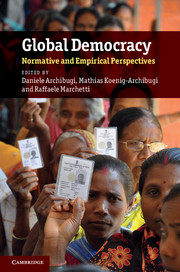Book contents
- Frontmatter
- Contents
- Figures
- Tables
- Notes on contributors
- Acknowledgements
- 1 Introduction
- 2 Models of global democracy
- 3 Citizens or stakeholders?
- 4 Is democratic legitimacy possible for international institutions?
- 5 Cosmopolitan democracy
- 6 Regional versus global democracy
- 7 Towards the metamorphosis of the United Nations
- 8 Flexible government for a globalized world
- 9 Global democracy and domestic analogies
- 10 Global democracy for a partially joined-up world
- 11 Civil society and global democracy
- 12 Global capitalism and global democracy
- 13 From peace between democracies to global democracy
- 14 The promise and perils of global democracy
- Index
- References
13 - From peace between democracies to global democracy
Published online by Cambridge University Press: 05 June 2012
- Frontmatter
- Contents
- Figures
- Tables
- Notes on contributors
- Acknowledgements
- 1 Introduction
- 2 Models of global democracy
- 3 Citizens or stakeholders?
- 4 Is democratic legitimacy possible for international institutions?
- 5 Cosmopolitan democracy
- 6 Regional versus global democracy
- 7 Towards the metamorphosis of the United Nations
- 8 Flexible government for a globalized world
- 9 Global democracy and domestic analogies
- 10 Global democracy for a partially joined-up world
- 11 Civil society and global democracy
- 12 Global capitalism and global democracy
- 13 From peace between democracies to global democracy
- 14 The promise and perils of global democracy
- Index
- References
Summary
In memory of Francesco and Alessandro Archibugi
who died in defence of the Roman Republic (1849)
The Roman Republic 1848–9
The revolutions of 1848, which led to the Second French Republic, also elicited emulators in the Papal States. On 9 February 1849, the Constituent Assembly, elected after free elections, established by decree that ‘the form of government of the Roman state, will be pure democracy and will take the glorious name of Roman Republic’ (Tommasini 2008, 246). The new republic was soon under fire from the old powers of Europe: Austrian troops from the north and troops from the Kingdom of the Two Sicilies and Spain from the south were eager to restore the temporal power of the pope and to suppress the revolutionary movement. But the first regiment to arrive at the gates of Rome was neither from the reactionary Austrians nor from the anachronistic Bourbons. Landing at Civitavecchia, a port less than 45 miles from Rome, was instead a contingent of 7,000 soldiers of republican France, led by General Nicolas-Charles Oudinot.
In Rome, they wondered whether these soldiers were sent to defend or to attack the republic. With the sole purpose of landing at the port of Civitavecchia without striking as much as a blow, the French sent a reassuring message: ‘The Government of the French republic, moved by liberal intentions, declares that it will respect the vote of the majority of the Roman population, and that it does as a friend, aiming at maintaining its legitimate influence: it is determined not to impose any form of Government on these people that is not desired by them’ (Tommasini 2008, 316). This was certainly sweet music to the Italian patriots, who perceived the Austro-Hungarian Empire as the principal enemy. It already occupied the Romagna region of the old Church state, with the consent of the pope, but against the will of the Constituent Assembly.
- Type
- Chapter
- Information
- Global DemocracyNormative and Empirical Perspectives, pp. 254 - 273Publisher: Cambridge University PressPrint publication year: 2011
References
- 1
- Cited by

